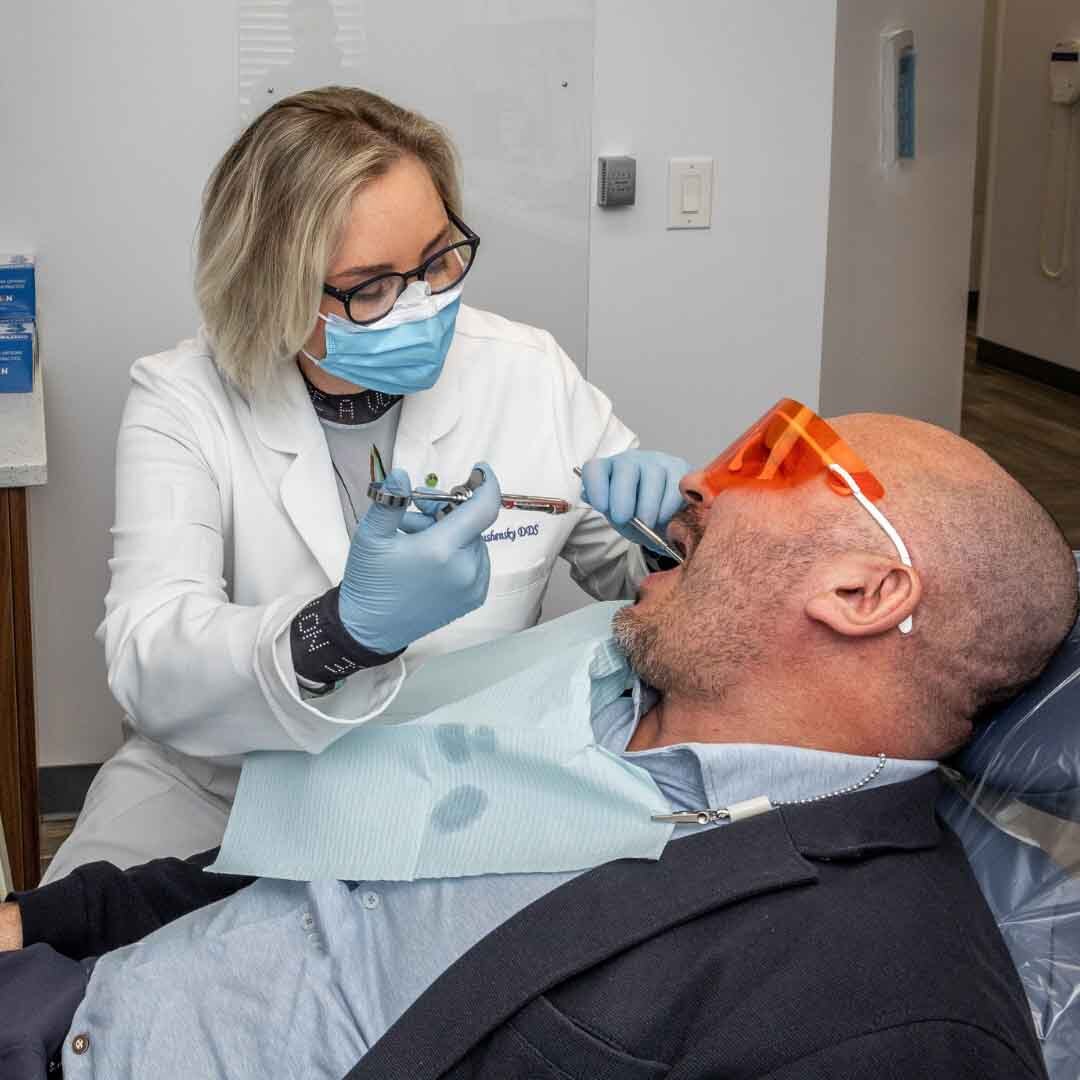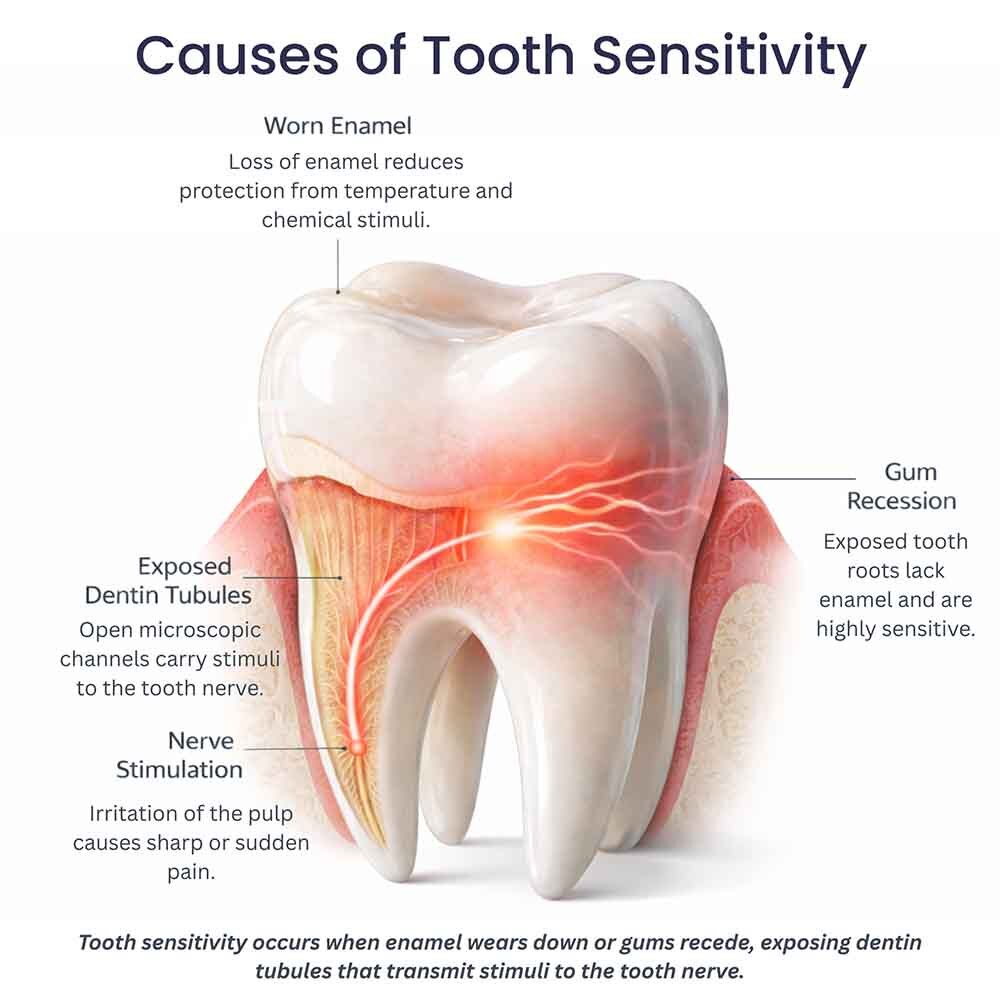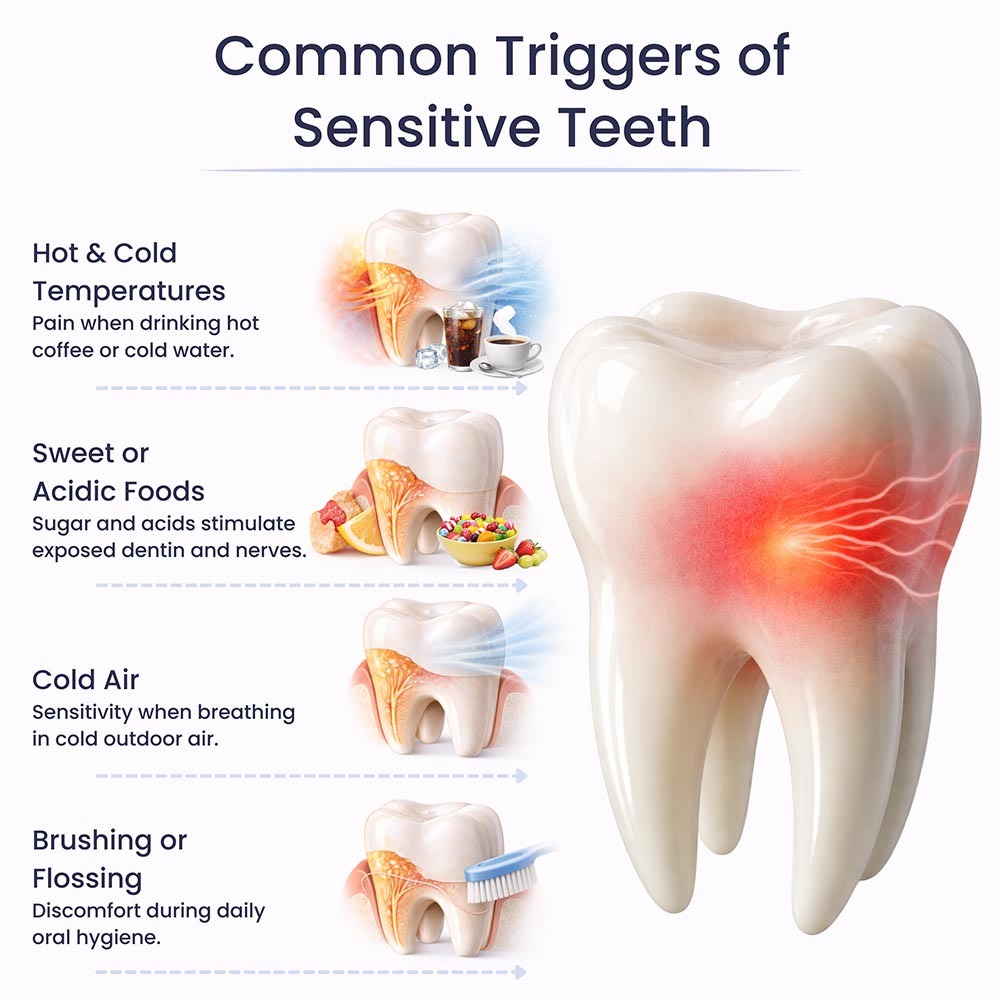 You settle down to enjoy an iced treat or a long cool drink, and as you take the first bite or sip, your teeth start to twinge uncomfortably. If this sounds familiar, you are not alone, and it’s estimated around 40 million adults in the United States alone will have tooth sensitivity at some stage. The condition is often triggered by consuming very cold, hot, acidic, or sweet or sour foods and beverages. If you breathe in through your mouth on a cold day, it can be enough to prompt discomfort or pain. Some people find their teeth feel more sensitive when they brush or floss.
You settle down to enjoy an iced treat or a long cool drink, and as you take the first bite or sip, your teeth start to twinge uncomfortably. If this sounds familiar, you are not alone, and it’s estimated around 40 million adults in the United States alone will have tooth sensitivity at some stage. The condition is often triggered by consuming very cold, hot, acidic, or sweet or sour foods and beverages. If you breathe in through your mouth on a cold day, it can be enough to prompt discomfort or pain. Some people find their teeth feel more sensitive when they brush or floss.
The most common sign of tooth sensitivity is pain that may be sharp or sudden and goes away soon afterward, or sometimes the pain is deeper. Although tooth sensitivity may be common, most people don’t realize why they have this condition, what can cause it, or even if there is any solution.
Usually, tooth sensitivity is due to loss of tooth enamel or some kind of break or crack in the enamel covering a tooth. Although enamel is tough, it can become chipped, broken, or worn due to enamel erosion, allowing hot, cold, or acidic sensations to penetrate the tooth underneath, called dentin. Dentin is considerably softer and more quickly eroded by acids and harmful decay-causing bacteria in the mouth, so the sensations can reach the tooth nerve right in the center very soon. By this stage, the tooth will feel very sensitive or painful. This can also lead to pulpitis.

The same thing can occur if tooth roots become exposed because these aren’t covered in enamel but instead have a coating of cementum over the dentin. Cementum is not nearly as hard as tooth enamel and is more quickly worn away.
Several factors can cause tooth enamel loss or damage and include the following:
When you eat anything sugary or starchy, the sugars are used by bacteria found in your mouth to thrive. As they do so, they create acid that erodes tooth enamel, gradually weakening it and eventually causing holes in the enamel. At this stage, the bacteria can enter the dentin, where they quickly cause cavities to form. A tiny pit in a tooth could conceal a larger cavity underneath. The same can occur if you eat lots of acidic foods like citrus fruits or diet soda.
Ideally, when you eat these foods, have them as part of your main meal rather than as a snack. If you want to brush your teeth afterward, wait at least half an hour for the acidity levels to begin normalizing so that when you brush, you will be brushing harder tooth enamel that is less easily damaged.

Tooth enamel might be hard, but it can still be worn away if you brush your teeth too vigorously or make the mistake of using a hard-bristled toothbrush. At the same time, brushing your teeth too hard can cause gum erosion, exposing your tooth roots that are more vulnerable to developing tooth sensitivity.
Instead, you only need to use small circular motions to clean your teeth gently using a soft bristled toothbrush. If you are unsure, you can always ask your dentist or hygienist for practical help and advice; they will only be too happy to demonstrate proper brushing techniques.
Have you begun waking up in the mornings with an aching jaw, teeth, or a chronic headache? You could have bruxism, where you clench and grind your teeth, which is normally a nocturnal habit. It can cause considerable damage to your teeth and gums, wearing away tooth enamel, making teeth more sensitive, and causing gum recession.
When you visit Atlas Park Dental, we can check your teeth, gums, and jaw joints for signs of bruxism. If needed, we’ll take diagnostic x-rays to assess your teeth and especially your jaw joints more closely, as the pressure of clenching and grinding can cause your jaw joints to become inflamed and painful. An easy way to treat bruxism is to have a custom-made night splint created so that when you try to grind your teeth, they bite harmlessly against the guard.
Gum disease is incredibly common and is a bacterial infection often caused by poor oral hygiene. Regular brushing and flossing aim to remove dental plaque, a sticky biofilm that contains harmful bacteria that can cause gum disease. If you fail to brush and floss regularly or don’t brush thoroughly enough, these bacteria can soon build up and create toxins that infect and inflame your gums. Eventually, the infection causes your gums to recede and expose your tooth roots, so tooth sensitivity is one of the signs of gum disease.
Gum disease is a major reason for visiting your dentist regularly because it can cause tooth loss and, even worse, affect your overall health. When you see your dentist every six months, they can check the condition of your gums carefully, picking up the early signs of gum disease. At this stage, called gingivitis, gum disease is entirely reversible. You may only need to have your teeth cleaned professionally and follow a better oral care routine at home to eliminate this disease. It’s a very different matter if you leave the disease to progress, as it can soon become chronic, and you may need ongoing treatment to control it.
Any damage to your teeth must be mended promptly, even if it seems minor. A tiny chip or crack in a tooth is enough to allow bacteria to get inside the tooth, even on small teeth, is enough to allow bacteria to get inside the tooth, destroying the dentin and causing a tooth infection that can cause sensitivity. This can also be considered an emergency dental situation if the pain is severe.
Regularly seeing your dentist ensures that any tiny chips or cracks are detected quickly and can be treated promptly. It’s often quite easy to mend a small crack or chip in a tooth with tooth-colored composite resin, protecting and preserving your tooth and eliminating tooth sensitivity.
If you have sensitive teeth, it’s always best to visit Atlas Park Dental in Glendale, NY, for a checkup. We’ll determine the cause and recommend the appropriate treatment to help you feel comfortable again. Schedule your appointment today.

My name is Victoria Kushensky. I am a general dentist dedicated to remaining at the forefront of my field. Combining compassionate care with extensive knowledge, I offer cosmetic and general dentistry services as well as advanced root canal treatments.
I earned my Doctor of Dental Surgery (DDS) degree from the esteemed New York University College of Dentistry. Throughout my career, I have honed my skills in various dental procedures, ensuring effective treatment for each patient’s unique needs. I prioritize patient comfort and understanding, taking the time to thoroughly explain procedures and address any questions.
More about Dr. KushenskyAtlas Park Dental
80-28 Cooper Ave #207
Glendale, NY 11385
(718) 894-2110